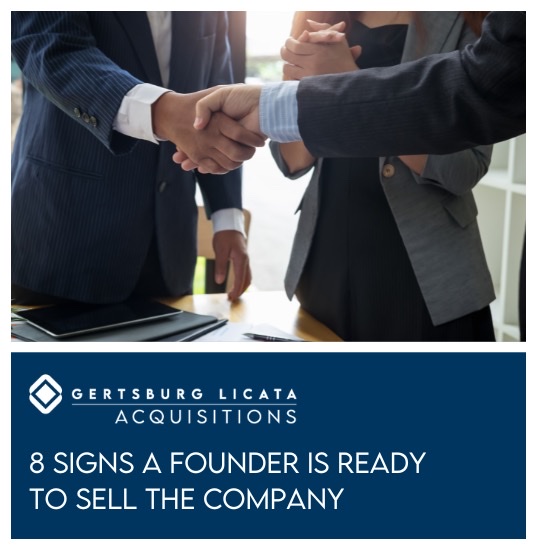A change in ownership can radically transform a company. For some, the sale of a company or notice that a company is willing to sell can be disruptive to internal and external stakeholders. It can also provide a great opportunity for those interested in buying an existing business.
People who are typically most interested in knowing when a company’s founder is ready to sell, include:
- Top executives who might want to submit an offer to purchase the company themselves
- Leaders of other companies or a direct competitor
- Middle-management executives who need to know if there’s room for advancement under new ownership or if they should start looking elsewhere.
- Other company employees affected by reorganization
Individuals in these groups may be looking for signs of an upcoming sale. Here are eight signs an owner is preparing a sale that stakeholders can watch out for.
1. Away from the Office More Than Usual
To get a company off the ground, founders practically live on the premises. Once a business is up and running and they’re confident in the teams they’ve built, they could be at the office a lot less often. Perhaps they’re out pursuing other business opportunities or maybe they’re putting more time and energy into their family. Whatever their reason, priorities could have shifted—perhaps enough that the right offer can convince them to part with their business.
Related: How to be a Smart Buyer When Acquiring an Insurance Agency
2. Realizing the Costs of Their Success
As a business’s value grows, owners often find there’s more at stake and more to lose. Many become increasingly risk-averse, especially compared to the company’s bold early years. Unwilling to continue on the rollercoaster of high-stakes decision-making, an owner might be open to an offer to sell the company for the right price.
Conversely, the company’s financial success may have come at too high a cost. A business that’s grown faster and larger than anyone anticipated can tax its leader, physically, mentally, and emotionally. Founders who seem exhausted, burned out, or constantly on edge might not be equipped to operate a business on that scale and might jump at the opportunity to sell to a buyer with experience in running larger companies.
Get an Accurate Business Valuation Based on Real World Data
3. Cutting Back on Costs
The business is thriving with a solid record of growth, increased profits, and an expanding market, but the founder has started laying people off and implementing other cost-reduction measures. This might be a sign they’re either trying to polish up the company profit-and-loss sheet for prospective buyers or prepare for a business valuation by an outside financial consultant. Cutting back on costs during a period of sustained growth is a sign that an owner may be preparing for a sale.
4. Facing a Shrinking Market
If the industry a business operates in is shrinking, perhaps due to new technologies or changes in public taste, a founder might start looking to cut their losses. If they can’t find a buyer who’ll match what the company’s assets are worth, the founder might be open to an offer from one or more senior officers, or someone in a related industry. They’ll be looking for someone who can turn the company around—especially if they’re able to retain an equity ownership interest.
5. Meeting with Executives from Other Companies
Meetings off-campus with leaders from other companies might be a clue that something’s already in the works—a sale, maybe, or a merger. Pay attention to the kind of companies these leaders come from: if they’re in the same industry as the founder’s own, or come from a competitor’s shop, you’ll want to keep your eyes open.
6. Gathering Information About an Unrelated Business
Similarly, if an entrepreneur-founder has begun focusing on aspects of another, unrelated industry, this might be a sign they’re considering moving on from their current business into another one.
7. Ready to Retire
After decades of hard work, founders nearing retirement age might start hearing the siren song of the golf course or the Bahamas cruise. What constitutes “retirement age”? Because there’s no official number in the U.S., where some executives bow out in their 50s and others work into their 70s and even 80s, each individual steps down when it makes sense for them. Owners in their late 50s or older who seem increasingly interested in legacy projects or tying up loose ends on projects already in motion might be preparing to retire. They’ll want to see their company in safe hands going forward.
8. Experiencing Big Events in Their Personal Life
Their own health problems, a serious illness in the family, a divorce, the arrival of grandchildren: Any of these can mean there’s less time and energy for the company. Founders who are going through significant changes outside of work might reprioritize their personal lives. Selling the company would represent a clean break and a chance to concentrate their focus where they need to.
Gertsburg Licata Acquisitions assists companies of all sizes to buy and sell businesses. To talk with an M&A professional, call us at 216-573-6000 or contact us here.
Disclaimer: Note that Gertsburg Licata Co., LPA (the “Firm”) is a law firm. Although Gertsburg Licata Acquisitions and Gertsburg Licata Talent are affiliates of the Firm, they are NOT law firms and neither they nor their representatives can provide you with legal advice. Nothing in this website should be deemed as soliciting any legal business by the law firm or any attorney in it, nor as an advertisement of legal services to individuals who have no prior relationship with the law firm or its attorneys. No legal advice will be given except by an attorney, after an engagement letter with the law firm is executed, or in anticipation thereof after speaking with an attorney. If applicable, then to the extent required by Rule 7.3 of the Ohio Rules of Professional Conduct, please note that parts of this document may contain ADVERTISING MATERIAL.









